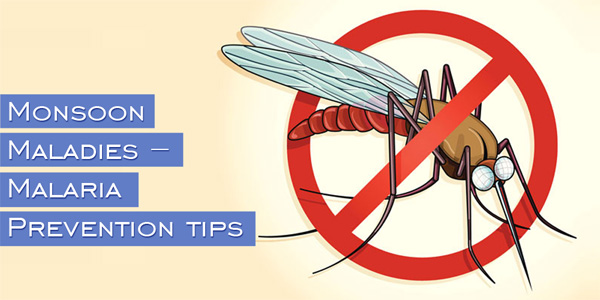Mosquitoes although tiny, can prove to be the most brutal killers during monsoon. Malaria is lethal and accounts for more than 500,000 deaths per year.
According to the World Health Organization (WHO), approximately half of the entire human population in the world is presently facing the risk of contracting malaria. Scientists have also issued a warning about the negative impact that this disease could have on the reproductive health resulting in poor quality of semen in men and increased risk of miscarriages in women.
The statistics are terrifying and a lot has to be done on an individual & government level in order to eradicate or at least curb the spread of this life threatening disease.
This mosquito borne, infectious and communicable disease generally shows symptoms like high fever, shivering chills and headache. Immediate medical attention is mandatory, failing which serious medical complications may arise thereby posing a grave risk to the patient’s life.
These important preventive measures can help you keep Malaria at bay:
- Maintain a high level of hygiene in your home. Dirty and unhygienic environment serves as a breeding ground for mosquitoes. In the absence of mosquitoes there would be no vectors to spread the disease. Scientists believe that housing improvements in certain settings can help eradicate malaria considerably.
- Make sure that you are sufficiently hydrated at all times
- Boil water before drinking and stick to home-cooked meals as much as possible. Strictly avoid consumption of food from roadside vendors and if needed prefer eating from hygienic food joints. Parents in particular should ensure that their children keep away from tempting roadside eatables like Bhajiyas, Wada pav, Golas, Pani-puri etc.
- Prevent food contamination by using good quality containers for storage purpose. Place leftovers in the fridge as soon as they get back to room temperature and do not consume food that is more than a day old. Make sure that the kitchen area is properly cleaned after cooking as it can be easily transformed into a breeding ground for parasites, germs and bacteria. Use a disinfectant while mopping the floor.
- If you have fever, do not venture outside. You may not only end up aggravating your own medical condition but also be putting others around you at risk of contracting infectious diseases. Fever that persists for more than 3 days should be reported to a doctor at the earliest. It’s always recommended to conduct a blood test for common monsoon ailments like Malaria, typhoid, dengue, jaundice, leptospirosis, cholera etc.
- During monsoon, mosquitoes and flies multiply at an alarming rate. Always apply a strong insect repellant to keep them at bay. Affix mosquito screens, nets and fibre glass meshes on your doors or windows to prevent these parasites from entering your home.
- You can also take an anti-malarial drug only if your doctor recommends the same
- Try to stay away from insanitary and damp places. Avoid walking through dirty water. Polluted water that is accumulated in potholes harbors many bacteria and germs which can later give rise to serious health issues
- Opt for light-colored clothes as dark colored outfits tend to attract flies & mosquitoes which also increases the risk of being bitten
- Mosquitoes do not thrive in cold temperature settings. Try to stay away from hot & humid environment for prevention of Malaria infection.


